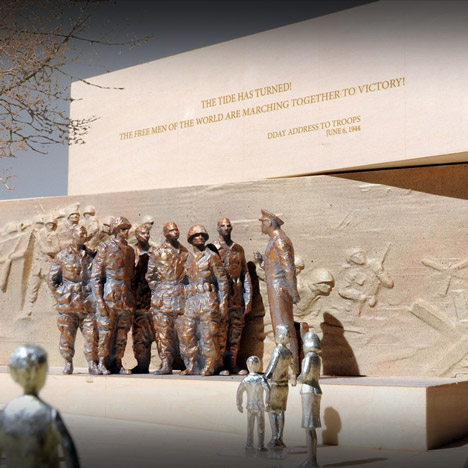News: an amended proposal by architect Frank Gehry for a memorial to President Dwight D. Eisenhower in Washington D.C. has been approved after several years of debate over its design.
Following a presentation by Gehry on Friday, the Eisenhower Memorial Commission voted through his proposed changes, despite continuing dissent from members of Eisenhower's family.
In 2011, Gehry accepted criticism of the original proposal, which the family claimed was too extravagant. The design features large woven steel "tapestries" depicting scenes from Eisenhower's early life in Kansas.
Gehry has now added plans for sculptures showing him with troops of the 101st Airborne Division at the Normandy landings and signing the first Civil Rights Act since Reconstruction.
"The memorial celebrates Eisenhower as general and president. In bronze and stone, he is represented by his words and by the people who helped him accomplish so much," said Gehry in a letter to the Commission.
"Eisenhower’s story, achievements, and words have been an inspiration to countless Americans," he added. "I hope you will find that the memorial we have designed to commemorate his life will serve as a beacon to amplify that inspiration."
Earlier this year, a Utah congressman attempted to introduce legislation to scrap Gehry's proposal, claiming it was too costly and controversial. It provoked an angry response from the American Institute of Architects, which said that lawmakers should not attempt to censor architectural work.
The Commision's decision to back the updated design means that the project can now be presented to the US Commission of Fine Arts and the National Capital Planning Commission.
Frank Gehry was recently asked to tone down his design for a new campus for Facebook in Silicon Valley, and also claimed that plans for a subway below his Walt Disney Concert Hall in Los Angeles could ruin the performances.
See all stories about Frank Gehry »
Read Frank Gehry's letter to the Eisenhower Memorial Commissioners below:
Commissioners:
Thank you for inviting me to be here today.
President Eisenhower said, “I come from the very heart of America”, and it is a sentiment he expressed often.
He did not come from great beginnings, yet he became a great general and a great President.
He was born in a modest frame house, yet he became one of the most revered occupants of the White House.
I come here today more humbled than ever to present the evolution of our design for the Eisenhower Memorial. I have spent the last four years immersed in Eisenhower’s words,and the words of those who have shaped how history will define him. These two perspectives are often at odds - one modest, the other monumental.
President Eisenhower’s historic achievements and his genuine humility combined to make him truly exceptional. This unique combination – common modesty paired with uncommon vision and leadership – is what equipped him, time and again, to overcome seemingly insurmountable odds; to succeed in the face of great adversity.
Victory in the face of obstacles is Eisenhower’s story, but it is also the story of America: the promise that anyone can rise from any background to become anything he or she wants, through hard work and diligence.
This is our history, but it is also our future. It is the promise that should inspire each visitor to the memorial.
In designing this memorial to President Eisenhower’s life of public service, we have striven to embody that balance, to create a physical memorial that exemplifies the immaterial qualities that have made him an indelible part of our nation’s legacy.
As you know, Eisenhower’s story starts in Abilene - the heart of the Middle West. Throughout Eisenhower’s life, he never stopped considering Abilene a part of himself – his true home. It was here that his identity was formed. It was here where he developed the qualities that would take him from the beaches at Normandy to the White House.
Abilene served as our inspiration for a backdrop to Eisenhower’s story – not only because of its importance to him, but because of its message to future generations of America’s leaders. Abilene serves as a reminder that out of difficult circumstance come character,innovation, and even greatness. It demonstrates that dreams can be achieved as long as they are bolstered by hard work, perseverance and education.
Eisenhower’s modest, pastoral roots are represented on the tapestries that surround the memorial and set the stage for the memorial core.
The memorial celebrates Eisenhower as General and President. In bronze and stone, he is represented by his words and by the people who helped him accomplish so much.
As General, he is depicted with the troops of the 101st Airborne Division, with thelanding at Normandy in the background.
As President, he is depicted in an artistic representation of him signing the first Civil Rights Act since Reconstruction.
The landing at Normandy was the turning point in the Western Front and in the salvation of Europe from the Nazis. The signing of the Civil Rights act was one of the many significant pieces of legislation that Eisenhower shepherded into law. It exemplifies his passionate advocacy for all of the citizens of this great country and his unshakable belief that everyone – regardless of their race– deserved equal access to the resources that make america great.
Eisenhower saw himself as an ordinary man, yet his leadership was extraordinary.
He was a humble man, yet his achievements continue to make Americans proud.
He did not set out to make history, but his strength of character has resonated for generations.
Eisenhower’s story, achievements, and words have been an inspiration to countless Americans. I hope you will find that the memorial we have designed to commemorate his life will serve as a beacon to amplify that inspiration.
Thank you.
Frank Gehry

